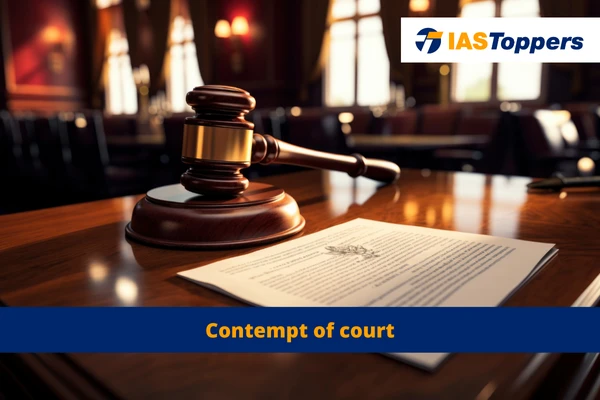Contempt of court in India refers to the act of showing disrespect, disobedience, or interference with the orderly process of a court. It encompasses disruptive behavior during court proceedings, disobedience of court orders, destruction of evidence, and intimidation of witnesses, both inside and outside the courtroom. The Contempt of Courts Act 1971 categorizes contempt as civil or criminal, with specific provisions for punishment and the involvement of the Attorney General in initiating cases.
Contempt of court will be helpful for UPSC IAS Exam preparation. GS Paper-2 Indian Polity.
Table of Content
- Contempt of court
- Types of Contempt of Court
- Attorney General’s Power
- Constitutional Validity
- Punishment
- Conclusion
- Frequently Asked Questions
What is Contempt of court in India?
- Meaning: Contempt of court is an act of disrespect or disobedience toward a court or interference with its orderly process.
- Examples: disrupting court proceedings, interfering with attempts to obtain evidence, destroying evidence, disobeying a court order, and intimidating witnesses.
- A contempt order may address behavior both in the courtroom and outside it, including public displays of disrespect toward the court.
Types of Contempt of Court
- According to the Contempt of Courts Act 1971, contempt can either be civil contempt or criminal contempt.
- Civil contempt of court means willful disobedience of any judgment, decree, direction, order, writ or other process of a court, or willful breach of an undertaking given to a court.
- Criminal contempt of court is attracted by the publication (whether by words, spoken or written, or by signs, or by visible representations, or otherwise) of any matter or the doing of any other act whatsoever which:
- Scandalizes or tends to scandalize, or lowers or tends to lower the authority of, any court; orPrejudices, or interferes or tends to interfere with, the due course of any judicial proceeding; or
- Interferes or tends to interfere with, or obstructs or tends to obstruct, the administration of justice in any other manner.
Attorney General’s Power
- Section 15 of the 1971 act describes the procedure for how a case for contempt of court can be initiated.
- In the case of the Supreme Court, the Attorney General or the Solicitor General, and in the case of High Courts, the Advocate General, may bring in a motion before the court for initiating a case of criminal contempt.
- The motion can be brought by a private citizen as well after the consent of the Attorney General.
- The motion will have to specify the contempt of which the person charged is alleged to be guilty.
- The consent of the A-G before taking cognizance of a complaint saves the time of the court.
- The A-G will independently ascertain whether the complaint is valid or not.
Constitutional Validity
- Article 129 of the Constitution gives the Supreme Court the power to initiate contempt cases on its own.
- Article 215 of the constitution provides High Courts shall have all the powers of such court including to punish for its contempt.
- In such a situation, the A-G’s consent is not required.
Punishment
- According to Section 12 of the Contempt of Courts Act 1971, the punishment for contempt of court in India is imprisonment extended to six months, with a fine which may extend to two thousand rupees, or with both.
- The accused may be discharged or the punishment awarded may be remitted on apology being made to the satisfaction of the court.
- Section 10 of the Contempt of Courts Act, 1971 empowers the High Courts (HCs) to punish contempt of its subordinate courts.
Conclusion
Contempt of court in India serves as a necessary legal tool to maintain the dignity and authority of the judiciary. It discourages disruptive behavior, disobedience, and interference with court proceedings, ensuring the fair administration of justice. The involvement of the Attorney General and the provision for punishment help uphold the integrity and effectiveness of the judicial system.
Ref: Source-1
| Other Articles in Polity & Governance | |
| Criminal Justice System in India | Lok Adalat |
| Jurisdiction of Supreme Court | Fundamental Duties in India |
| Inter-State Water Disputes | Lokpal |
FAQs (Frequently Asked Questions)
What do you mean by contempt of court?
Contempt of court is an act of disobedience or disrespect toward a court or interference with its orderly process.
What are the types of contempt of court?
There are two types of contempt of court: civil contempt and criminal contempt.



